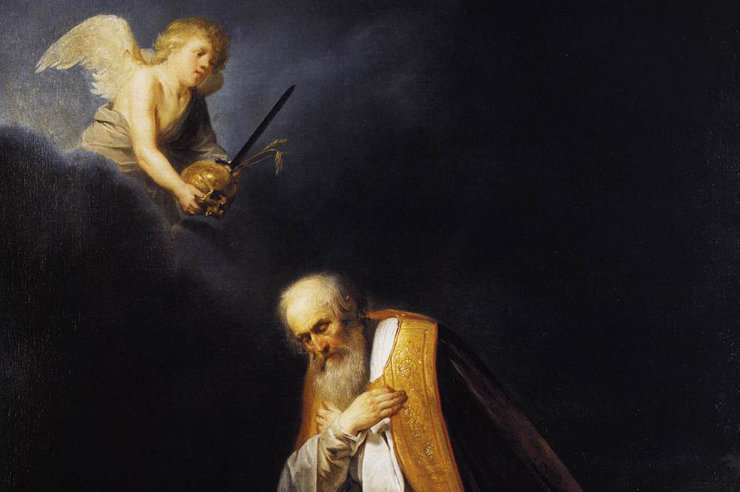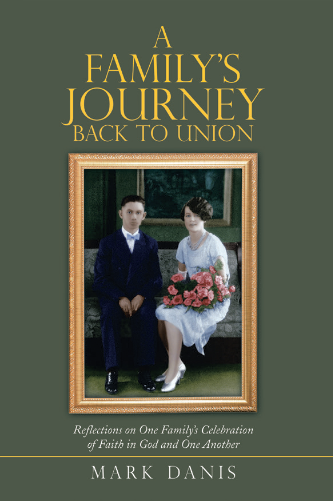A Sacrifice of Prayer
by Deacon Mark Danis | September 1, 2020 12:04 am
 [1]
[1]One of the greatest means for deepening and expanding our prayer life is found in Paul’s teaching on our becoming like Christ.
“Indeed I count everything as loss because of the surpassing worth of knowing Christ Jesus my Lord. For his sake I have suffered the loss of all things, and count them as refuse, in order that I may gain Christ and be found in him, not having a righteousness of my own, based on law, but that which is through faith in Christ, the righteousness from God that depends on faith; that I may know him and the power of his resurrection, and may share his sufferings, becoming like him in his death…” (Philippians 3:8-10).
But what exactly is Paul saying? Just how is it that we are to become like Christ? Are we, in fact, to be crucified ourselves? Are we to live the experience Christ lived in giving Himself up for our salvation? Well in a way, yes.
This is a challenging teaching, but we should first consider where this commission of Paul’s comes from.
“For as many of you as were baptized into Christ have put on Christ” (Galatians 3:27).
Paul explains that as part of our Baptism, regardless of when it occurred, we have put on Christ, we have clothed ourselves with Him. This is obviously sound theological teaching, but again, what does it mean? How do we live this out in our daily lives?
Elizabeth of the Trinity, a French Carmelite nun who died in the early part of the twentieth century, and who was recently canonized a Saint by Catholic Church, wrote a prayer shortly before her death where she explained it this way:
“O my Beloved Star, so fascinate me that I may never be able to leave your radiance. O Consuming Fire, Spirit of Love, overshadow me so that the Word may be, as it were incarnate again in my soul. May I be for him a new humanity in which he can renew all his mystery.” (St. Elizabeth of the Trinity)
Beyond the beautiful and poetic language, Elizabeth is expressing a very simple reality about our life in Christ. We know the author of the Letter to the Hebrews refers to our God as a Consuming Fire in chapter 12:29. We also know that Christ descended from Heaven in order to be Incarnated into a human body at His birth and His entry into this world.
“Consequently, when Christ came into the world, he said, ‘Sacrifices and offerings thou hast not desired, but a body hast thou prepared for me…’” (Hebrews 10:5)
We also know that Christ’s own body became the sacrifice that was acceptable for our salvation. But Elizabeth focuses on what her own role is in this offering and, by extension of our baptism, she also identifies what our role as well. Elizabeth proposes that we must each become an extension of Christ’s humanity, each of us must become a soul who allows Christ to continually renew His mystery within us.
But then what is this mystery she speaks about? Well, according to Paul:
“I appeal to you therefore, brethren, by the mercies of God, to present your bodies as a living sacrifice, holy and acceptable to God, which is your spiritual worship” (Romans 12:1).
This then is the mystery. Just like Christ, we are to present our bodies as a living and holy sacrifice. We are to join Christ in His Redemptive work of salvation for the human race. Paul explains it this way:
“I have been crucified with Christ; it is no longer I who live, but Christ who lives in me; and the life I now live in the flesh I live by faith in the Son of God, who loved me and gave himself for me” (Galatians 2:20).
Paul of course is not saying that he has literally been crucified at this point, though we know he would be martyred later. Instead, he is saying that his old nature has died, and in fact continues to die a little each day.
“I protest, brethren, by my pride in you which I have in Christ Jesus our Lord, I die every day!” (1 Corinthians 15:31).
Each day he seeks to more fully conform himself to the image of Christ living within him. He offers his own body as a sacrifice: through all of the hardships he endures, through all his pains, though all his disappointments, through all the losses he experiences, and by the offering of his daily prayer.
“We always thank God, the Father of our Lord Jesus Christ, when we pray for you…” (Colossians 1:3).
You see, in the very same circumstances that might discourage us, disappoint us, and at times even lead us to question God’s love and tender compassion for us, Paul finds the means for offering himself as a living sacrifice. It is in those very times that we have the power, through faith, to become more and more like Christ, to express our sincere love for Him, and to participate with Him in His redemptive work of salvation for the world.
We know that in our daily offering of prayer, each and every day we can offer a sacrifice which will indeed be found acceptable to God. And then we will be able to say, along with King David:
“Let my prayer be counted as incense before thee, and the lifting up of my hands as an evening sacrifice!” (Psalm 141:2)
Please take some time this week to offer prayers that we might all find the grace to offer a sacrificial offering of daily prayer. It is a sacrifice (yes, just consider how much we struggle to actually do it). But for that very reason, it is a sacrifice the Lord will find very acceptable.
God Bless
 [3]Be sure to check out Mark’s new book from Westbow Press: A Family’s Journey Back to Union[4]: Reflections on One Family’s Celebration of Faith in God and One Another.
[3]Be sure to check out Mark’s new book from Westbow Press: A Family’s Journey Back to Union[4]: Reflections on One Family’s Celebration of Faith in God and One Another.
This is the story of one extended family’s journey back through the lost years and distant miles to rediscover their union with one another. It is the story of four generations who came together to respond to each other’s trials and tragedies, and to celebrate their victories and blessings. So many forces today are imposing themselves and tearing families apart; this is the story of one family’s response to that reality. It is about their resilience and reliance on prayer, God and one another. You will be blessed by reading the brief stories of what brought them back together and how they maintain their connection to each other. But the real blessing will be found in the spiritual reflections and material for prayer and meditation that have served to grow and keep this community of family and friends together for over a decade.Readers are encouraged to use the reflections in their own prayer life and to share them. But more importantly, we hope readers will make the effort to establish communities of prayer among their own families and friends. We promise if you do, you will experience God’s healing power and His blessings in ways you could never have imagined.
Please share this post on Facebook and other social media you choose below:
- [Image]: http://www.integratedcatholiclife.org/wp-content/uploads/hofmann-christ-at-thirty-three-best-featured-w740x493.jpg
- via Wikimedia Commons: https://commons.wikimedia.org/wiki/File:5201-king-david-in-prayer-pieter-de-grebber.jpg
- [Image]: https://www.amazon.com/Familys-Journey-Back-Union-Reflections/dp/1973688336
- A Family’s Journey Back to Union: https://www.amazon.com/Familys-Journey-Back-Union-Reflections/dp/1973688336
Source URL: https://integratedcatholiclife.org/2020/09/danis-sacrifice-of-prayer/